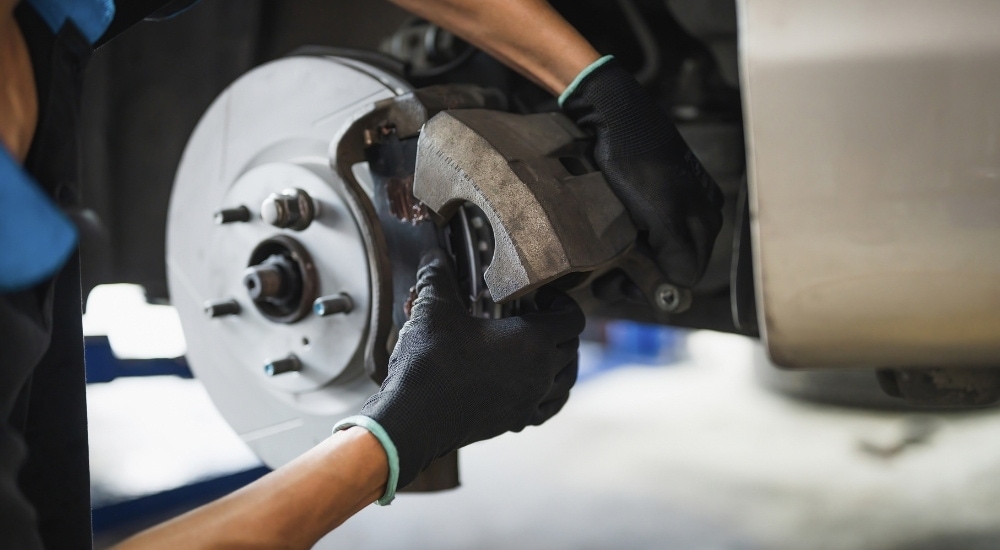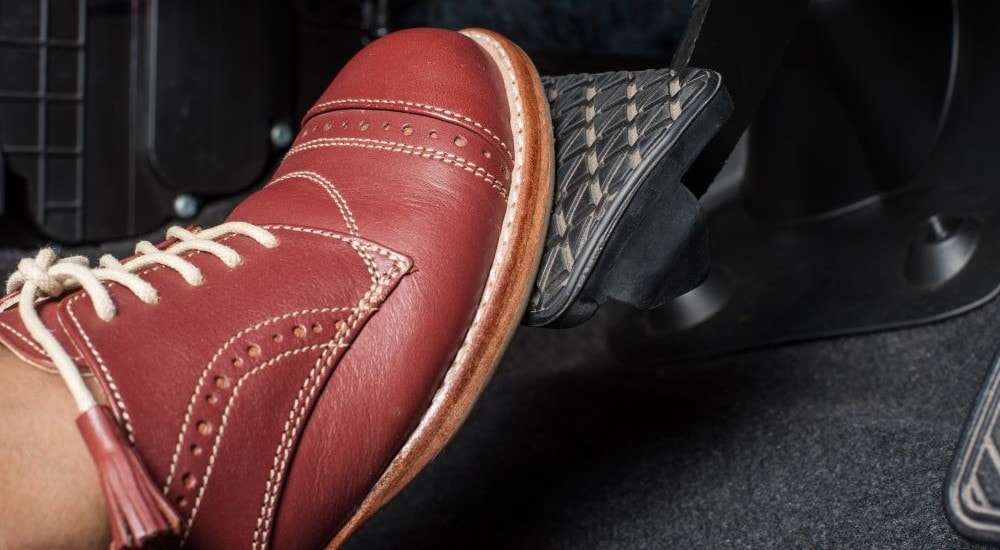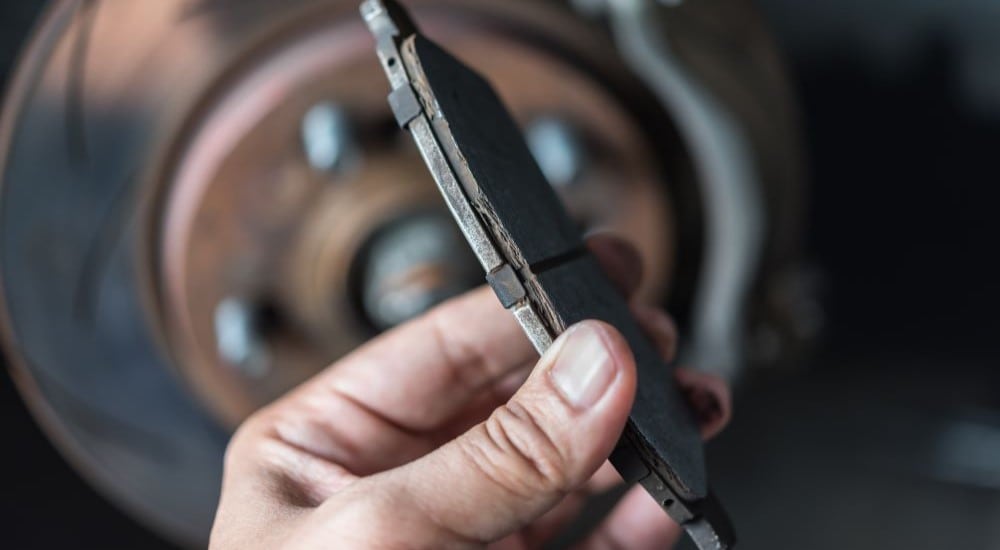Brake Basics: Understanding Your Car's Stopping Power

How much thought do you give to your vehicle's stopping power? Most of us don't think twice when we engage the brake pedal unless we're flooring the brake to avoid a collision. However, your vehicle's complex brake system deserves more consideration before a dire search for brake service in Charlotte. Why?
The brakes are pivotal in your safety behind the wheel, but how do they work? What causes their wear and tear, and how can you extend their lifespan? What are the most common signs of brake issues? What are the various types of brake-related services?
As one of the most trusted automotive names in the region, we're here to help. We're excited to give you a front-row seat to our expertise as we answer your questions and outline the many brake-related services our award-winning dealerships provide. Let's get started!
Brakes 101: How They Work and Why They're Important
Do you remember how Fred Flintstone used his feet to stop the Flintmobile? True to cartoon form, Fred's feet were unquestionably powerful. However, this isn't a viable option in real life. Even if "leg day" rules your time at the gym, your feet aren't strong enough to stop your car without assistance. Thankfully, that's where brakes play a pivotal role.
The brake system maximizes the stopping power behind your foot using hydraulic pressure. When you engage the brake pedal, a brake component called the master cylinder sends pressurized brake fluid throughout the system. The fluid reaches the calipers, causing the pistons to press the brake pads against the rotor or disc at the wheels. This pressure generates the friction necessary to slow the wheels and bring your vehicle to a stop.
This complex system works behind the scenes when you deploy the brake pedal, whether using the brakes to slow your cruising speed or to stop at a red light. Because of this, if any component in the system fails, your vehicle's stopping power is affected. For example, leaking brake fluid affects the hydraulic part of the system, while worn brake pads mitigate the friction needed to safely and effectively stop your car.
Brake Wear and Tear: What Role Do You Play?
Imagine driving around Charlotte and counting the number of times you engage the brakes. The count would likely be surprisingly high because the brakes are integral to your vehicle's performance in every situation. Naturally, this means the brakes are prone to wear and tear, from everyday driving to the environmental conditions and quality of the components themselves.
While controlling the environment is impossible, you can mitigate the wear and tear on your brakes by being mindful of your driving habits. Extending the life of your brakes requires a slow and steady input behind the wheel. Instead of aggressively accelerating and braking, anticipate traffic conditions and give yourself time to gradually apply the brakes rather than waiting until the last minute.
You can also mitigate extensive wear and tear on the brake system by being mindful of your cargo. Trucks and many large SUVs can tow heavier loads, but knowing the size of the load and your vehicle's payload and towing capacities is critical. An overloaded vehicle puts more strain on the brakes and puts you at greater risk of losing control. Alternatively, if towing heavy loads is a necessary part of your routine, your vehicle will likely need more frequent brake services to replace worn components and low fluid levels.
Brake Service Frequency: Service and Replacement Intervals
What's the best guideline for brake service? How often should you replace brake-related components? Unfortunately, there's no specific guideline because many factors affect the performance and longevity of your brakes.
When you rely on one of our service centers, our technicians will inspect the brakes during every routine oil change and tire rotation. They'll evaluate the brake pads, rotors, discs, and other components, noting signs of wear and alerting you when it's time for a replacement. Typically, brakes are designed to endure years of wear and tear, making component replacement and brake tune-ups far less frequent. Ultimately, the manufacturer recommends the best service interval for your make and model in your owner's manual.

Signs of Brake Issues
How do you know when it's time to bring your vehicle in for brake service? The easiest indication is exactly that: a Brake Light indicator staring back at you from the dashboard. Most modern vehicles have brake-monitoring technology that alerts you to issues with the system, from worn brake pads to low fluid levels. However, sometimes brake trouble isn't as easy to spot as a light on the dashboard.
Strange Noises and Smells
Your brakes should work silently behind the scenes, which means strange noises and odors indicate trouble. Many brake pads feature a wear indicator, which produces a high-pitched squeal as the metal of the pad rubs against the rotor. Alternatively, a grinding noise can indicate uneven rotors, with the noise caused by the pads rubbing against higher contact points on the rotors. In other scenarios, you may notice a burning smell or see smoke near the wheel; the burning odor occurs when the brakes overheat, while smoke points to trouble with the calipers.
"Soft" Braking Sensation
Engaging the brake pedal should require some effort as your foot works against resistance in the pedal. If you can depress the pedal all the way to the floor or the pedal feels soft, it's time for brake service. A soft or spongy brake often indicates a malfunctioning master cylinder, which is pivotal in distributing the pressurized brake fluid throughout the system. If the system malfunctions, the entire system is compromised, and your stopping power is dramatically diminished.
Steering Issues and Odd Movements
When you apply the brakes, does your car pull to one side rather than maintain a straight course? The key is to notice if this occurs when you apply the brakes. Why? A car that doesn't steer in a straight line can mean suspension or wheel-related issues, but it can also suggest trouble with the brakes. For example, if one of the front brakes doesn't work, your car will pull to the side that still functions.
Beyond driving in a straight line, you may notice different movements in your steering wheel. As you engage the brakes, does the steering wheel vibrate or shake? These movements are concerning and indicate it's time to have the rotors inspected. Time spent in the driver's seat causes wear on the rotors. However, if the surface of the rotors is worn too thin or unevenly, the brake pads won't make optimal contact and can cause vibrations or pulsations in the steering wheel.
Common Brake Services: What to Expect
When you trust one of our certified service centers, brake inspections are part of every routine oil change and tire rotation. Our technicians evaluate the brake components during this service, checking the pads, rotors, calipers, hoses, and fluid. This assessment provides insight into the system's current condition and helps you plan for upcoming needs. When it's time to address those needs, our technicians are always ready to help.
Brake Fluid
One of our most common brake-related services involves checking, flushing, and replacing the brake fluid. Over time, navigating the Charlotte roadways can take a toll on your brakes. Routinely checking the brake fluid level is essential to ensure the system has what it needs to maximize your stopping power. Beyond these routine checks, the system needs to be flushed, during which we'll check the brake lines for leaks or damage before adding new brake fluid.
Brake Pads and Rotors
Aside from fluid checks, our brake services include replacing the system's various components. The brake pads on your vehicle are designed to endure extreme wear and tear, but that doesn't mean they won't eventually wear down. When this occurs, our technicians can replace the brake pads and inspect the rotors. Depending on the thickness of the rotors, our technicians can either resurface the rotors to extend their longevity and optimize their performance or replace them altogether.

Your Brake Service Destination
Now that you're well-versed in brake basics, it's time to find a team you can trust to handle your next brake service. Fortunately, our technicians are ready to handle the job and ensure your vehicle has the stopping power to keep you safe in the driver's seat. Moreover, you can rest easy knowing our team treats every car like their own and every customer like family.
 AdChoices
AdChoices